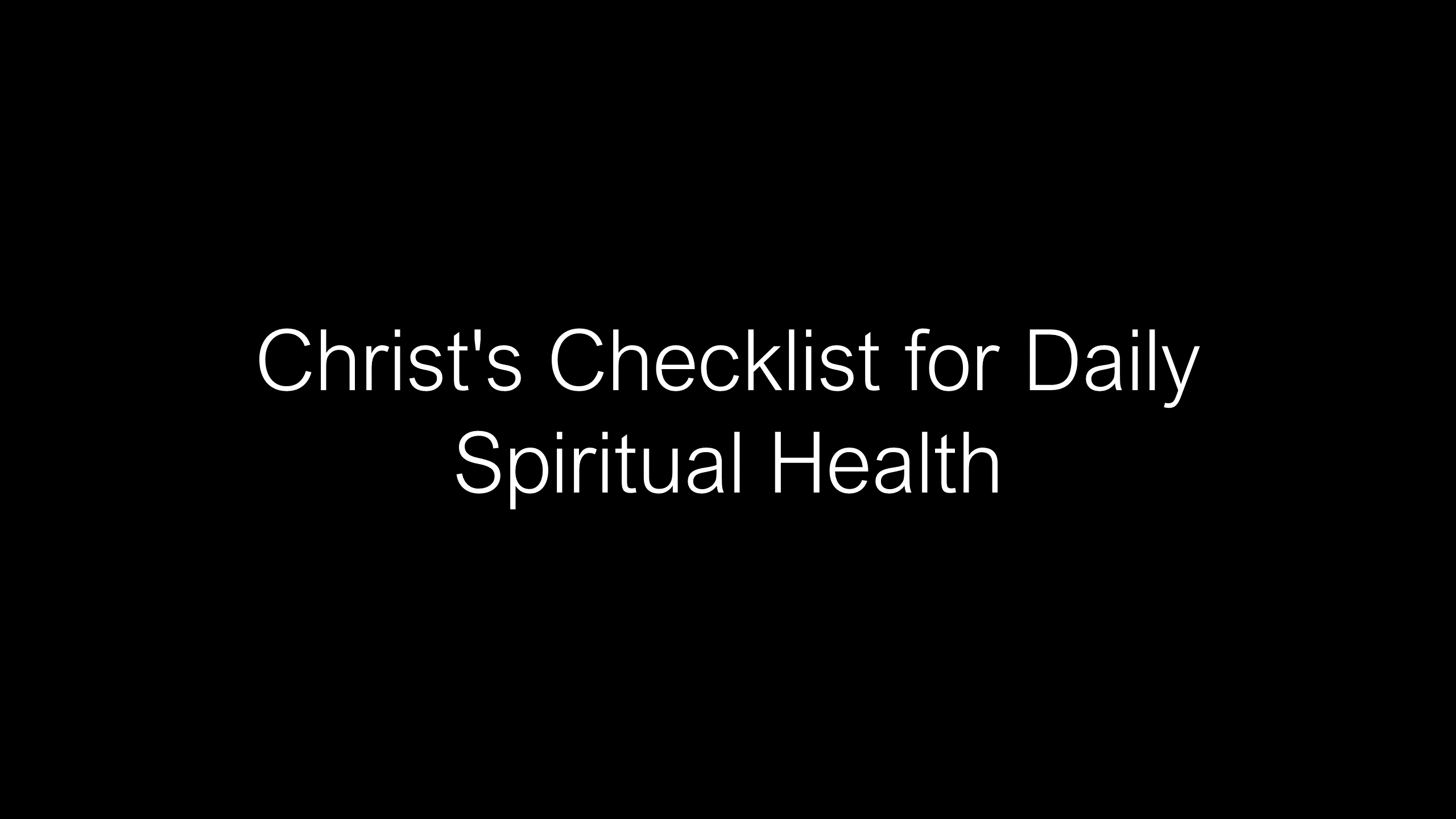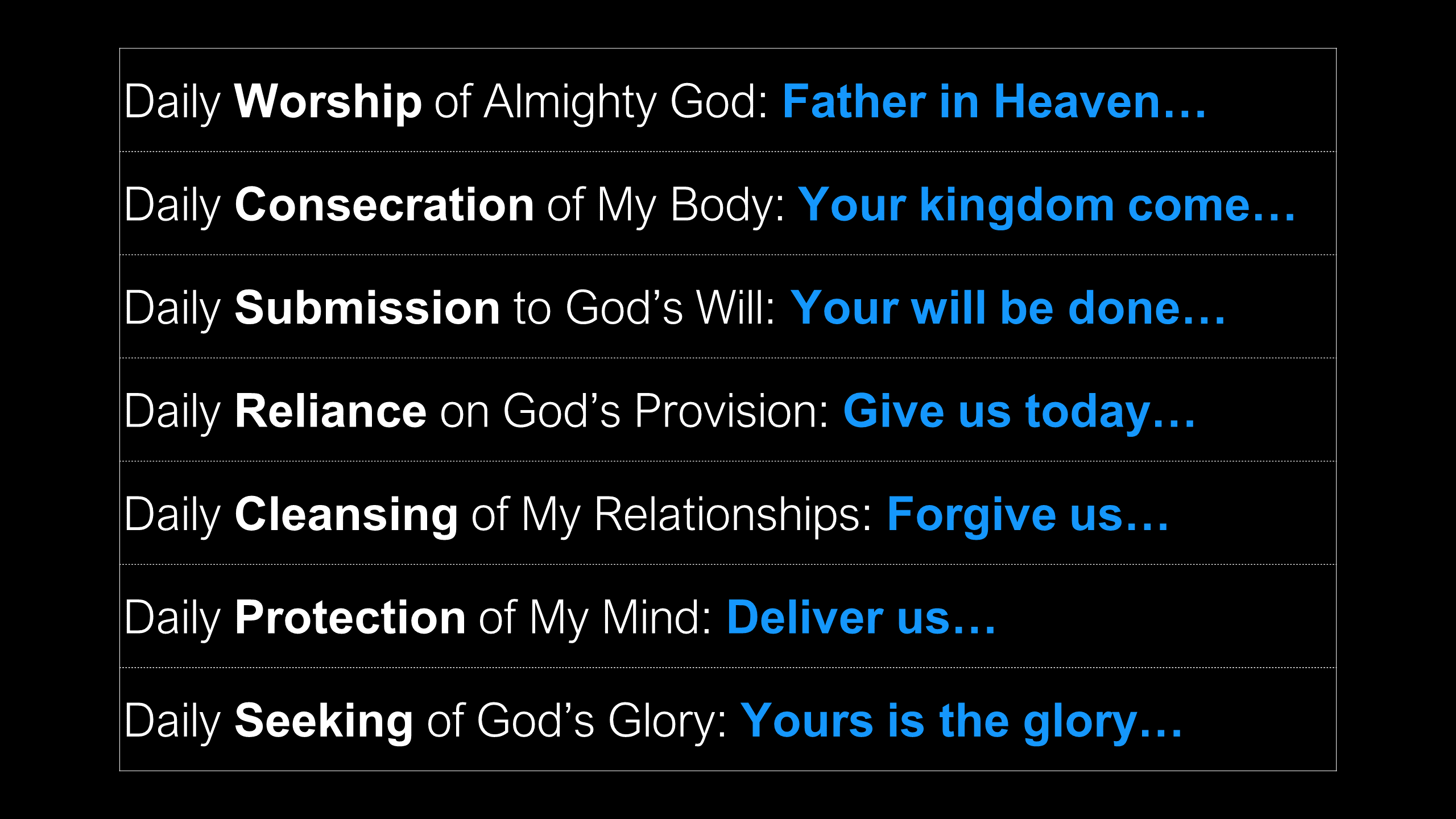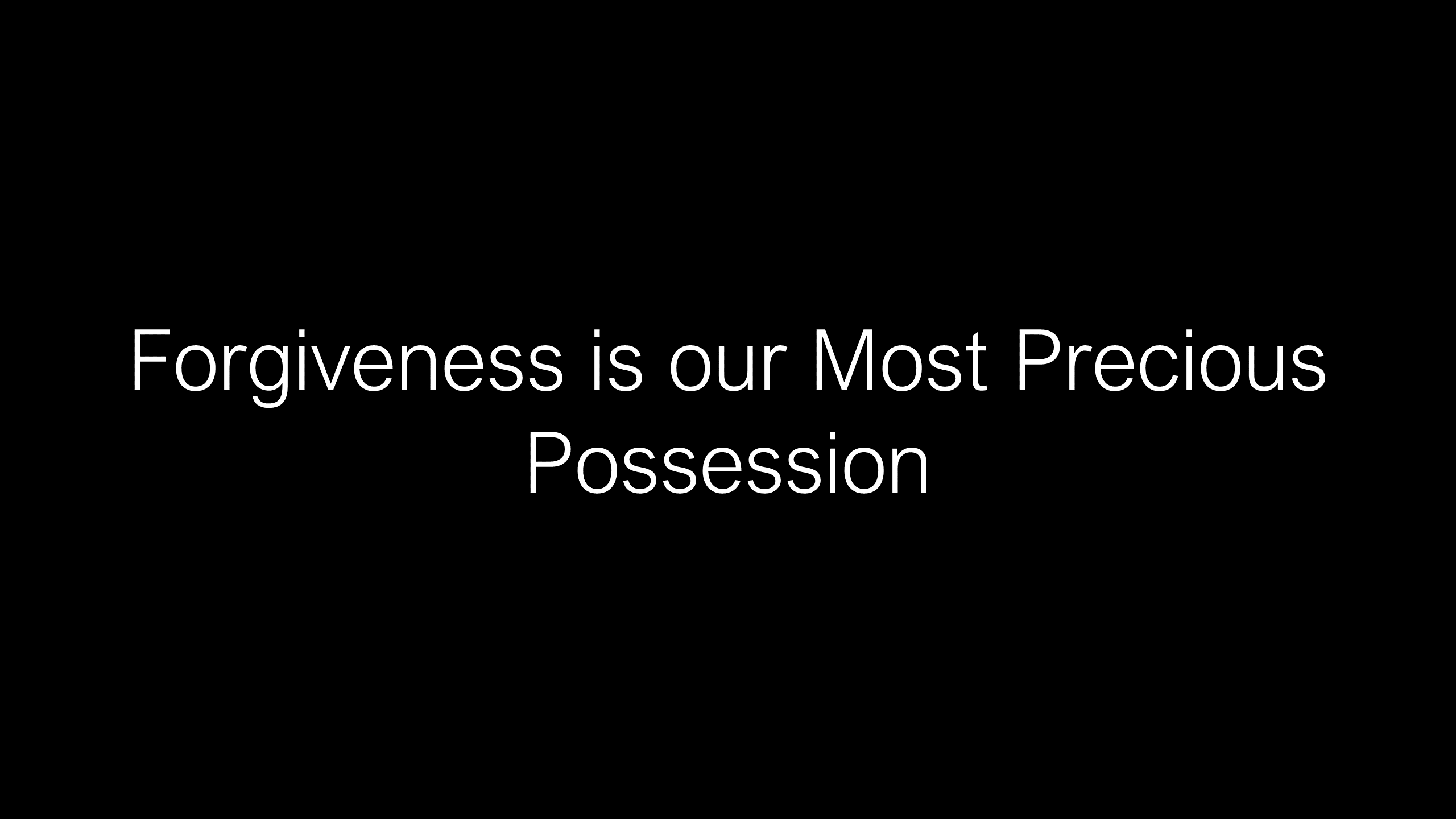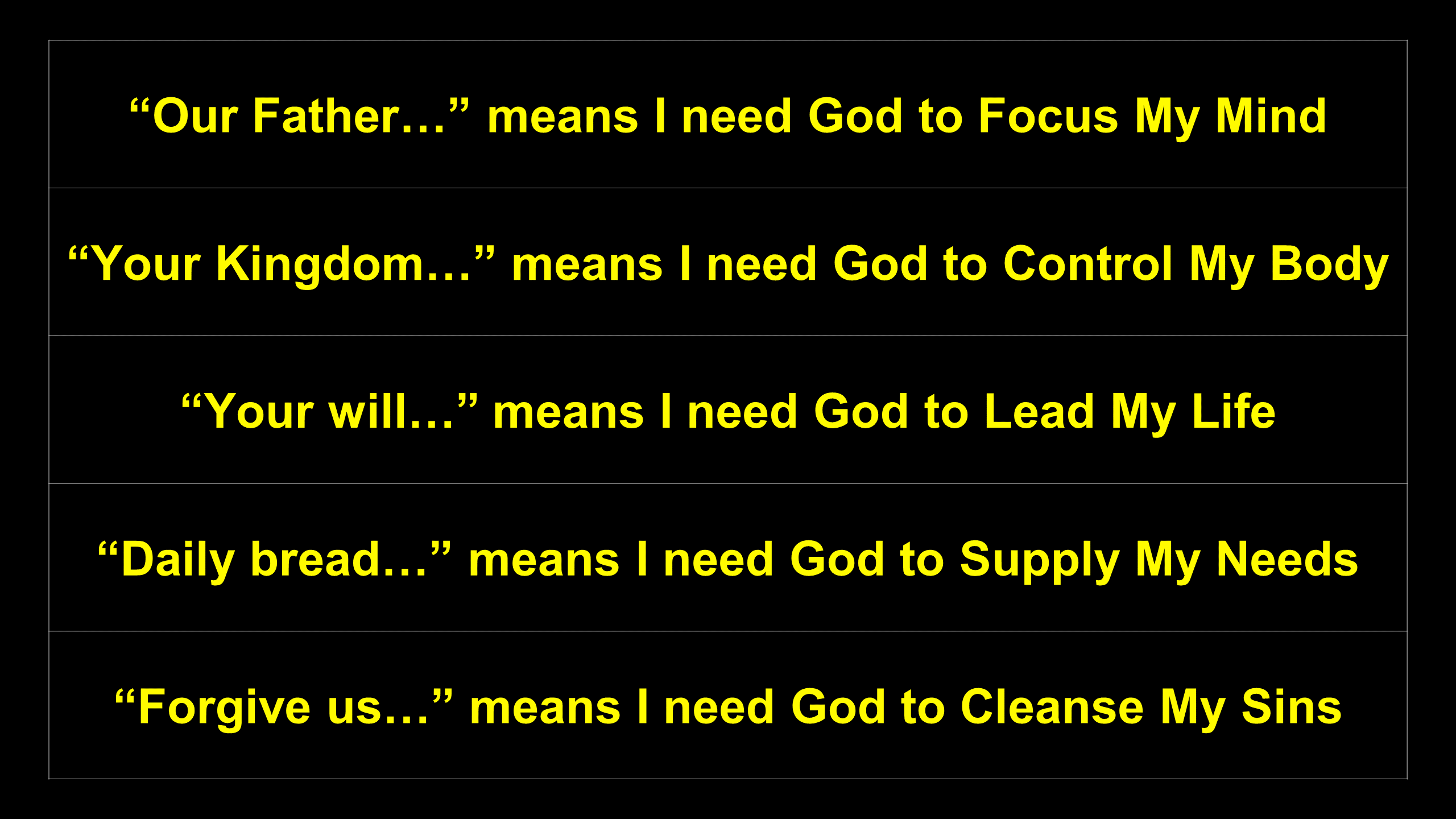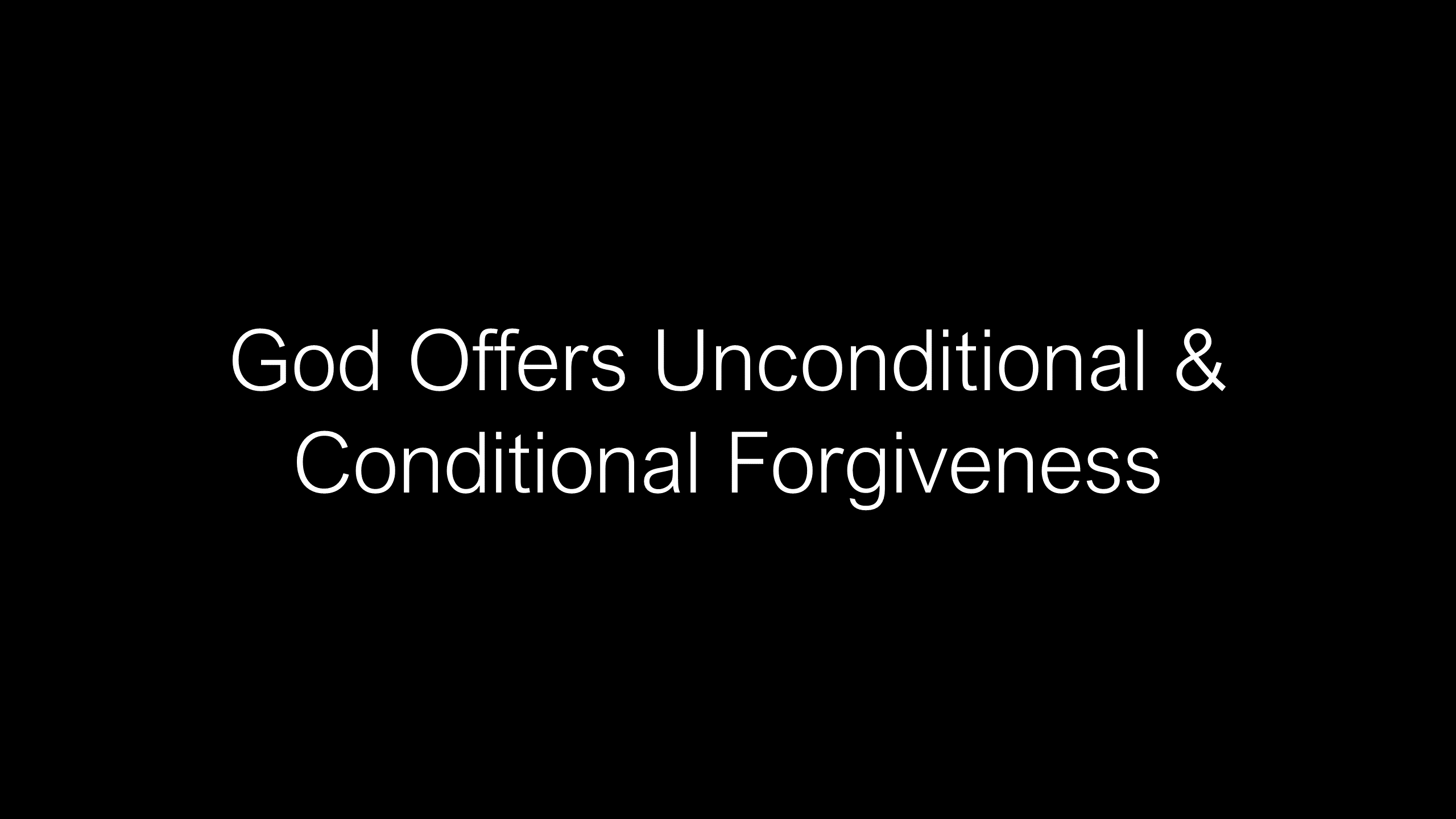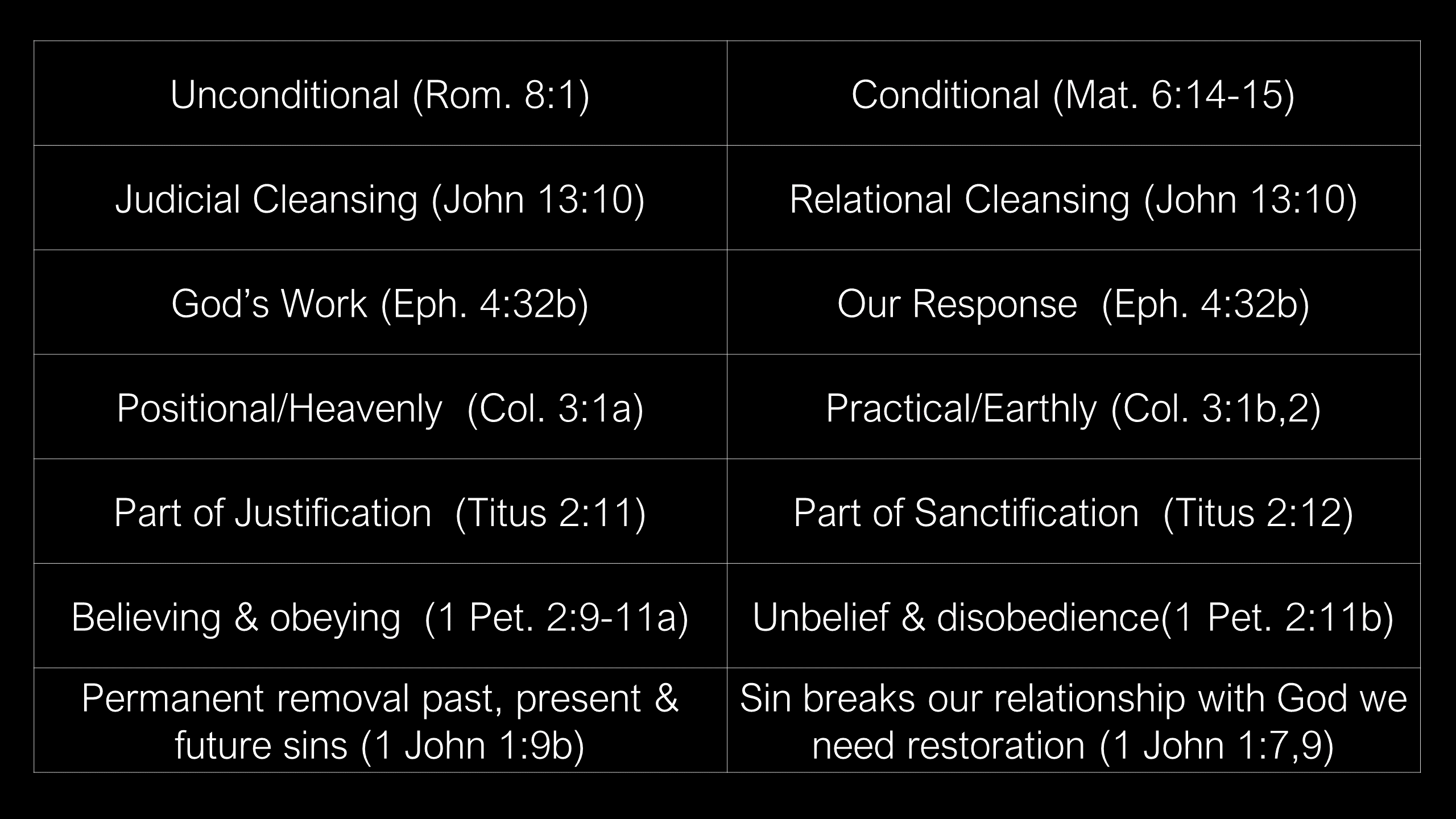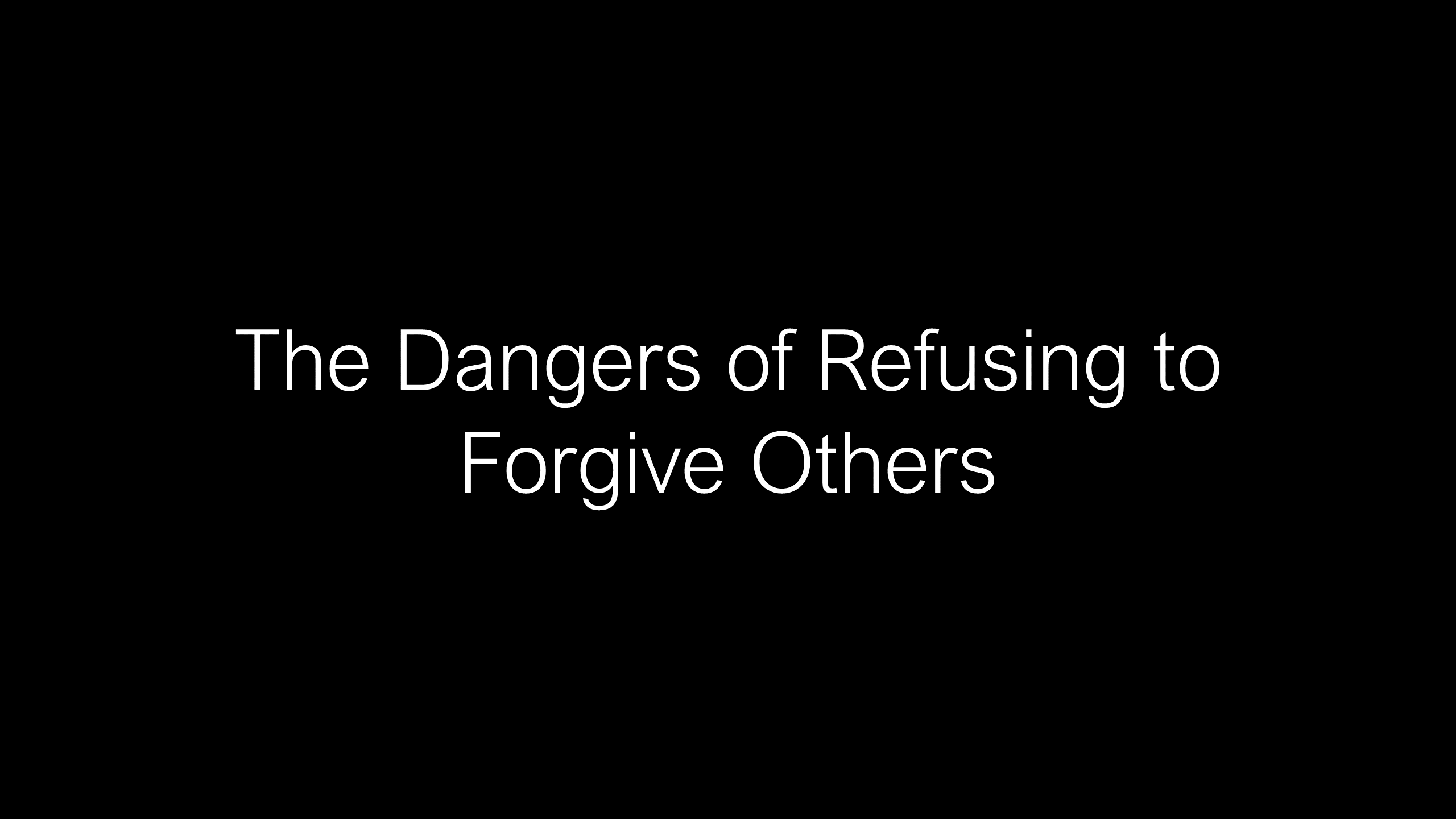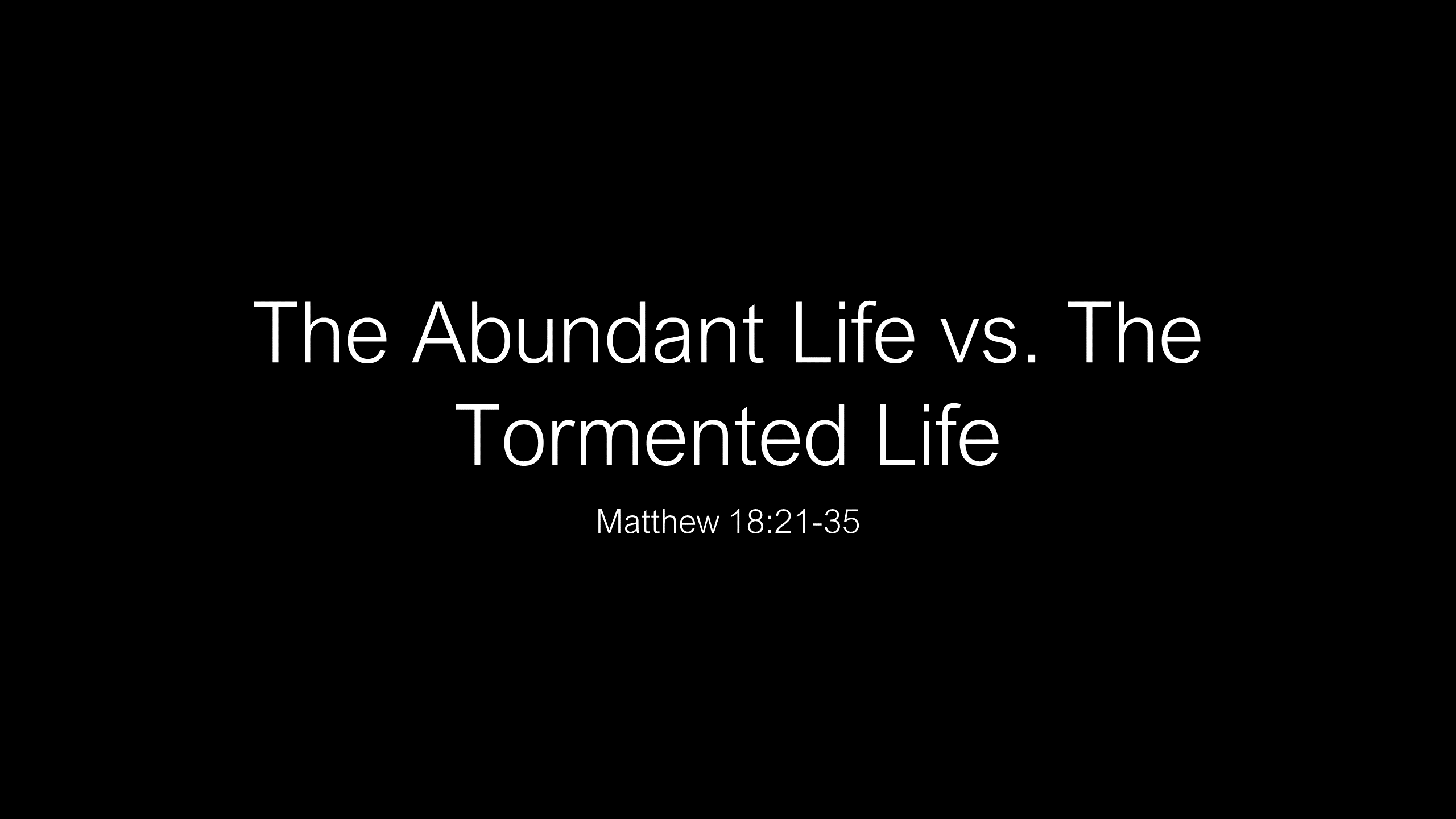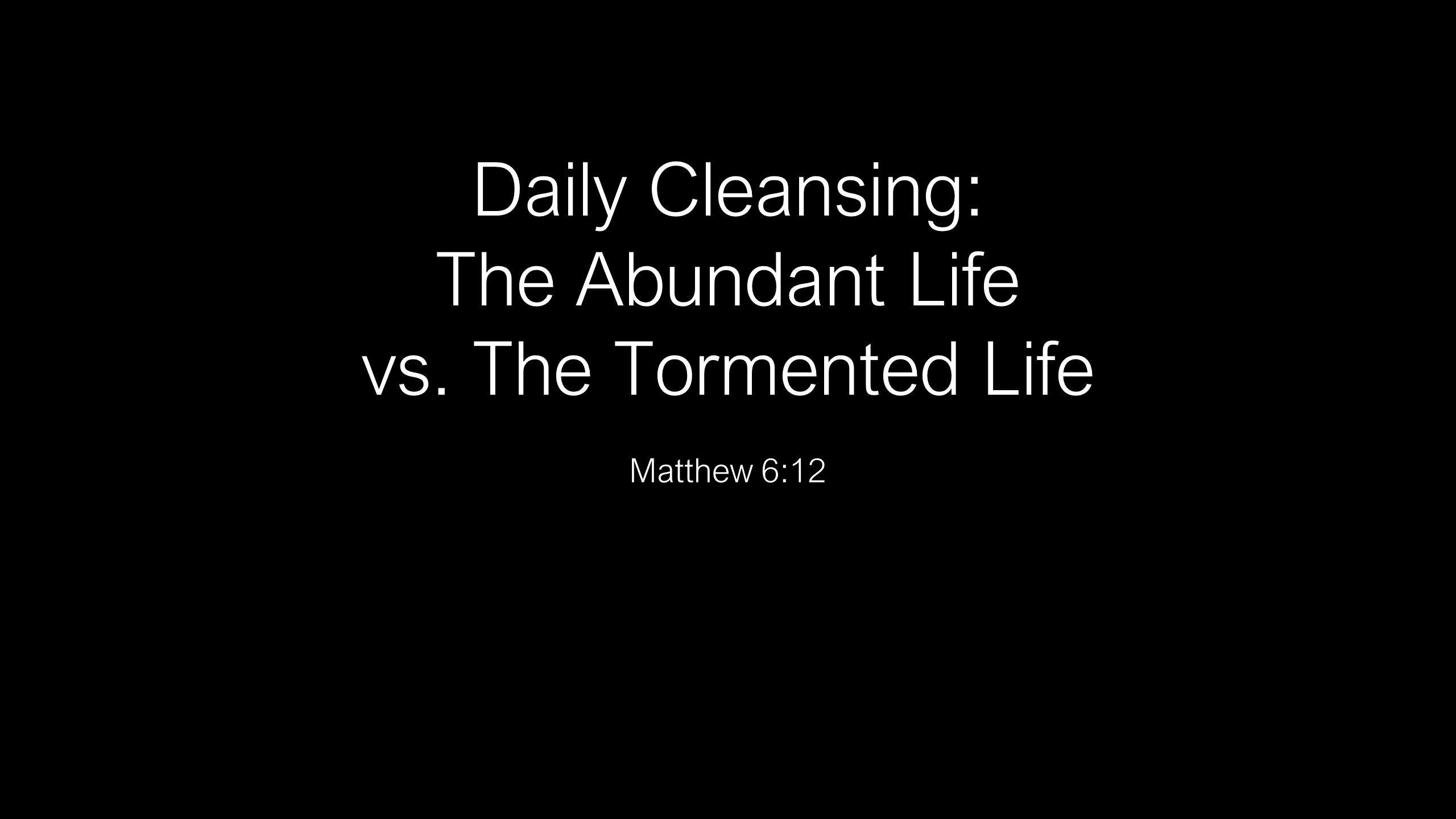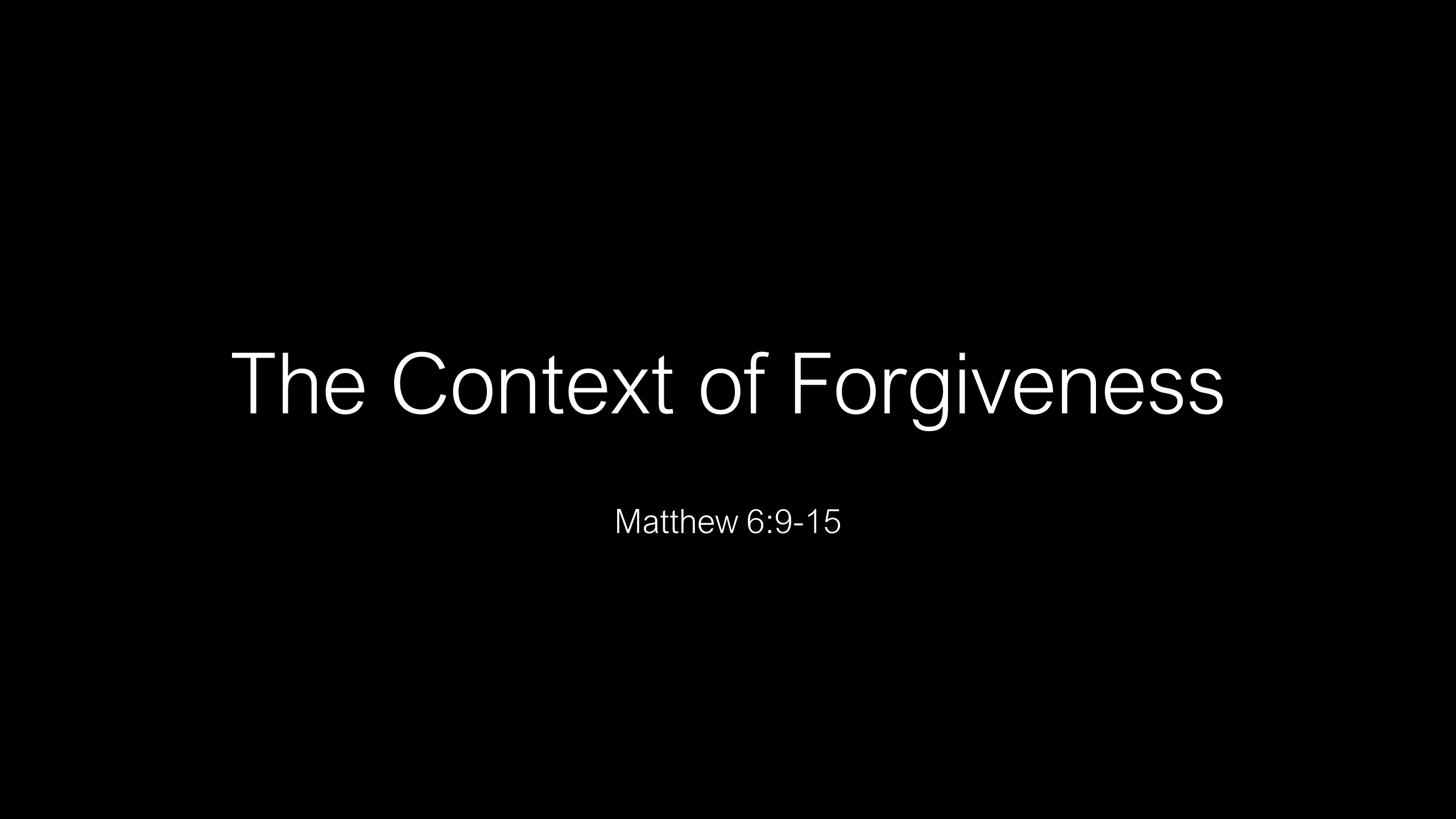If the YouTube video above is not available, here are two other ways to view:
151129AM Daily Cleansing
SWS-03
.docx
Daily Cleansing: The Abundant Life
vs. The Tormented Life
Matthew 6:12
As we open to Matthew 6, we have come to the fifth petition of the Lord’s Prayer in v. 12. This petition is all about the constant need we have for cleansing. This next area we are to maintain in our spiritual lives is all part of:
Christ’s Checklist for Daily Spiritual Health
Simply stated, the Lord’s Prayer is a pattern for us, a check list for our daily spiritual health.
Living a spiritually healthy life, that is useful to God each day is built around these key elements:
1. Daily Worship of Almighty God: Our Father
2. Daily Consecration of My Body: Your Kingdom Come
3. Daily Submission to God’s Will: Your will be done
4. Daily Reliance on God’s Provision: Give us this day
5. Daily Cleansing of My Relationships: Forgive us as we forgive
6. Daily Protection of My Mind: Deliver us from evil
7. Daily Seeking to God’s Glory: Yours is the glory
As we read the Lord’s prayer in the wider context of what Christ says we will see the strong emphasis on our need for forgiveness. Note as we read that we hear the word “forgiveness” six times in these eight verses. Matthew 6:9-15 (NKJV):
In this manner, therefore, pray: Our Father in heaven, Hallowed be Your name. 10 Your kingdom come. Your will be done On earth as it is in heaven. 11 Give us this day our daily bread. 12 And forgive us our debts, As we forgive our debtors. 13 And do not lead us into temptation, But deliver us from the evil one. For Yours is the kingdom and the power and the glory forever. Amen. 14 “For if you forgive men their trespasses, your heavenly Father will also forgive you.15 But if you do not forgive men their trespasses, neither will your Father forgive your trespasses.
Pray
Forgiveness is Vital
One moment before our last breath on earth, more than anything else we will want to know that we are forgiven. Jesus explains that God that father forgives sins, but attaches to our enjoyment of that blessing, a great responsibility. The forgiven must be forgiving, or else.
Christ’s words are very sobering. The forgiveness of my sins was so precious that it must spill over into our hearts such gratitude that anyone else’s sins against me can even come close to how great my sin was against God.
I was forgiven so much, that all other’s sins in my sight are miniscule compared to my sins in God’s sight. That is why we must remind ourselves of how:
God Summarizes What We Need To Live
“Our Father…” means I need You to Focus Me:
Because we are so weak, fearful, and distracted, we need to pause each day and reorient my life to Who God really is.
We need God to focus our hearts upon His Majesty.
Lord, I want to Worship You, so focus me upon how great You are today.
“Your Kingdom…” means I need God to Control Me:
Because we are so easily wanting our own way.
Like Isaiah 53:6 says, we each turn to our own way by habit.
That’s just how we are wired.
So we need to pause each day to surrender our body back to God’s control, and then reaffirm our trust in His plans.
Lord, I want You to Control me, so I surrender to your control today.
“Your will…” means I need God to Lead Me:
Because we are so easily misled and confused, and needy of help to find our way in life, and we are so unable to know the future that we really need daily guidance.
Lord, I want You to Guide me, so I will seek to follow You today.
“Daily bread…” means I need God to Supply Me:
Because we are so temporary, frail, insufficient and unable to even go without sleep for very long.
I need to pause each day to ask God to give me what I need to not just survive today, but be filled and satisfied.
Lord, I feed me daily bread by Your Word, to supply me so I see Your Hand in my life.
“Forgive us…” means I need God to Cleanse Me:
Because we are so prone to bumps, scrapes, and wounds that easily get infected with bitterness.
So I need to pause and seek the cleansing forgiveness You give for all my sins against You.
Lord, I want to experience the healing that comes through releasing all my hurts and injuries to Your care, and receiving the joy of being completely forgiven and forgiving.
Our biggest problem in life is sin.
Our biggest area of sin is usually in our relationships with others. Look at the sin list in Galatians 5, out of 17 categories of sin, 8 of them are interpersonal.
Beware of Sin
In our daily lives we are by habit conscious of the countless microbes, bacteria, viruses, and malicious pathogens that are so tiny they are invisible but so powerful they can’t be ignored.
If you saw someone splashed with some deadly substance, or handling some highly contagious, infected materials wouldn’t it strike you with a desire to warn them, and protect yourself? That is how clearly we need to protect ourselves against sin.
Sin separates humans from God. Sin is thus humanity’s greatest problem. Sin controls our minds, and contaminates our souls. No human is exempt from sin except for One. All others except Jesus are warped and contaminated.
Sin is behind every evil in society and our lives. All pains and unhappiness originate with sin. Sin brings guilt, sorrow, despair, and finally damnation. Sin is at the heart of every lie, as well as all immorality, pride, rebellion, untruthfulness, and murder. Sin brought sorrow, sickness, and death into our world.
Only God can forgive sin and heal our sin-infected minds. Since this prayer is for believers, the debts in v. 12 are the sins we commit after salvation. God forgives us judicially once for all in the justifying death of Jesus Christ. But we need on a daily basis the relational cleansing of the effects of our ongoing sins.
That is why Jesus says we are to ask God to forgive us, because forgiveness is at the heart of who we are. We are forgiven by God for all our sins. Therefore, we can never stop forgiving others. Forgiveness as we saw earlier is the theme of these eight verses (v. 9-15), referred to six times. Listen to John MacArthur:
Believers have experienced once-for-all God’s judicial forgiveness, which they received the moment Christ was trusted as Savior. We are no longer condemned, no longer under judgment, no longer destined for hell (Rom. 8:1). The eternal Judge has declared us pardoned, justified,
Jesus’ act of footwashing was therefore more than an example of humility; it was also a picture of the forgiveness God gives in His repeated cleansing of those who are already saved. Dirt on the feet symbolizes the daily surface contamination from sin that we experience as we walk through life. It does not, and cannot, make us
Jesus gives the prerequisite for receiving forgiveness in the words, as we also have forgiven our debtors. The principle is simple but sobering: if we have forgiven, we will be forgiven; if we have not forgiven, we will not be forgiven. [1]
The Dangers of Refusing to Forgive Others
Back in Mt. 6:14-16, note how Jesus immediately enlarges upon the dangers of an unforgiving attitude as soon as this model prayer is stated.
Believers experience two kinds of forgiveness by God. The first is once and for all and is permanent. When a person trusts in Jesus Christ as Savior and Lord, all of his sins-past, present, and future-are judicially forgiven, totally and eternally. But because believers are still subject to the temptations and weaknesses of the flesh, they fall into sin even after they are saved. For that sin they need God’s daily forgiveness and cleansing, not to preserve their salvation but to restore the broken relationship with the Lord that the sin causes. Jesus had these two aspects of forgiveness in mind when He said, “He who has bathed needs only to wash his feet, but is completely clean; and you are clean” (John 13:10).
Believers’ forgiveness of each other has no power to absolve or cleanse sin as God’s forgiveness has absolved and continues to cleanse theirs. Nevertheless their forgiveness of each other should reflect the two kinds of forgiveness they receive from God. They are to have in their hearts an internal, general spirit of forgiveness that is ready to forgive even before they know of a sin committed against them and whether or not the person has asked or ever asks for forgiveness. That forgiveness should be constant and unchanging, reflecting a divinely empowered love that Peter says “covers a multitude of sins” (1 Pet. 4:8). If and when the offending person repents, then relational forgiveness is readily given and the broken relationship is fully restored.[2]
Now turn onward to Mt. 18 where Jesus makes a startling revelation. One of the key areas of spiritual danger comes to believers who hold resentments, hurts, bitterness, and all other lacking of kind, tenderheartedness.
Jesus’ point in the parable is the same as Paul’s here: Those who have been graciously, totally, and permanently forgiven by God for their immeasurable sins against Him are to act like the divine children and heirs they have become by reflecting the love and compassion of their heavenly Father. They are to “be kind to one another, tender-hearted, forgiving each other just as God in Christ also has forgiven [them]” (Eph. 4:32).[3]
When believers forget their own divine forgiveness by God and refuse to extend human forgiveness to fellow believers, the Lord puts them under such torturers (the word can refer to inquisitors) as stress, hardship, pressure, or other difficulties until the sin is confessed and forgiveness is granted. As James tells us, “Judgment will be merciless to one who has shown no mercy” (James 2:13).[4]
Matthew 18:21-35 (NKJV)
21 Then Peter came to Him and said, “Lord, how often shall my brother sin against me, and I forgive him? Up to seven times?” 22 Jesus said to him, “I do not say to you, up to seven times, but up to seventy times seven. 23 Therefore the kingdom of heaven is like a certain king who wanted to settle accounts with his servants. 24 And when he had begun to settle accounts, one was brought to him who owed him ten thousand talents. 25 But as he was not able to pay, his master commanded that he be sold, with his wife and children and all that he had, and that payment be made. 26 The servant therefore fell down before him, saying, ‘Master, have patience with me, and I will pay you all.’ 27 Then the master of that servant was moved with compassion, released him, and forgave him the debt. 28 “But that servant went out and found one of his fellow servants who owed him a hundred denarii; and he laid hands on him and took him by the throat, saying, ‘Pay me what you owe!’ 29 So his fellow servant fell down at his feet and begged him, saying, ‘Have patience with me, and I will pay you all.’ 30 And he would not, but went and threw him into prison till he should pay the debt. 31 So when his fellow servants saw what had been done, they were very grieved, and came and told their master all that had been done. 32 Then his master, after he had called him, said to him, ‘You wicked servant! I forgave you all that debt because you begged me. 33 Should you not also have had compassion on your fellow servant, just as I had pity on you?’ 34 And his master was angry, and delivered him to the torturers until he should pay all that was due to him. 35 “So My heavenly Father also will do to you if each of you, from his heart, does not forgive his brother his trespasses.”
Christ’s Answer was a Stern Warning
This parable seems to suggest that as a means of His loving discipline, God might actually magnify the temporal consequences of sin. Though the guilt of sin is forgiven so that it will never be an issue in eternal judgment, God may permit the consequences of sin to be even more severe, in order to motivate a sinning believer to obey. Because unforgivingness is so completely foreign to what Christians should be, Christ applies this threat particularly to that sin: “So shall My heavenly Father also do to you, if each of you does not forgive his brother from your heart” (v. 35).
Christians ought to be the most forgiving people on earth, because they have been forgiven as no one else has. Therefore, those who refuse to forgive are worthy of the most severe kind of discipline from the hand of a loving Father.
James 2:13 gives an inexorable principle of divine justice: “Judgment will be merciless to one who has shown no mercy.” For the unsaved, the prospects of this principle are fearsome indeed. Those who have been merciless will have no mercy in the eternal court of God. They will suffer eternal torment entirely without mercy.
But there is an application of this principle for the believer as well. Christians who fail to show mercy will be subject to divine chastisement without much mercy. That is the whole message of this parable. I am convinced that multitudes of Christians who suffer from stress, depression, discouragement, relationship problems, and all sorts of other hardships experience these things because of a refusal to forgive. Forgiveness from the heart would liberate the person immediately from such “torturers”—and glorify God in the process.[5]
The Abundant Life vs. The Tormented Life
Jesus offers us a life more and more abundant. Like Proverbs 3 talks about our lives just get brighter each day we walk following him. But when we don’t. When we allow the bumps and bites, scrapes and hurts of life to get infected, then we go from abundant to tormented.
This suggests that forgiveness must be fulfilled as a condition before we can ask God for forgiveness. And Luke’s use of the present tense expresses a continual spirit of forgiveness in the hearts of those who ask for forgiveness.5 The two passages are not contradictory. Jesus stated it both ways to dynamically express the truth that a heart that asks for God’s forgiveness must be a heart that has forgiven and continues to forgive.
This is an unavoidable New Testament truth. St. Augustine called Matthew’s version “the terrible petition” because if we pray “Forgive us our debts, as we have forgiven our debtors” with an unforgiving heart, we are actually asking God not to forgive us.
God So Loves That He Forgives
Listen to the New Testament.
“For if you forgive men when they sin against you, your heavenly Father will also forgive you. But if you do not forgive men their sins, your Father will not forgive your sins.” (Matthew 6:14, 15)
“Blessed are the merciful, for they will be shown mercy.” (Matthew 5:7)
Judgment without mercy will be shown to anyone who has not been merciful. Mercy triumphs over judgment! (James 2:13)
“Then the master called the servant in. ‘You wicked servant,’ he said, ‘I canceled all that debt of yours because you begged me to. Shouldn’t you have had mercy on your fellow servant just as I had on you?’ In anger his master turned him over to the jailers until he should pay back all he owed. This is how my heavenly Father will treat each of you unless you forgive your brother from your heart.” (Matthew 18:32–35)
The Scriptures are so conclusive on this matter that the Puritan Thomas Watson said, “A man can as well go to hell for not forgiving as for not believing.”6 And the nineteenth-century preacher Charles Spurgeon said, “Unless you have forgiven others, you read your own death-warrant when you repeat the Lord’s Prayer.”7
True believers forgive and are forgiving. That does not mean they do not wrestle with forgiveness. It does not mean that forgiveness comes naturally to real Christians. Many Christians’ bitterness and hatred recur even though they have forgiven the offender. It is hard to maintain a forgiving spirit. But actually the struggle is evidence of God’s grace in the believer’s heart, because otherwise he or she would just give in to the hatred. The warning here is for those who claim to be Christian but will not forgive and have no desire to do so.[6]
Applying the Fifth Petition Today
The importance of being forgiving cannot be overstressed. We do this for the health of our own souls. Bitterness causes innumerable ailments—emotional, physical, spiritual—within us. We do it for the health of the church. The church is weak and defeated because of refused forgiveness among its children. We do it for the sake of the world. The world has not yet discovered what Christ is like. But it can, if we will truly forgive.
Do you need to forgive your spouse? Covenant to do it right now. Have you been unwilling to forgive your parents? Promise God right now that you will do it. Have you forgiven your employer who wronged you? You need to do it now—and you can, with Christ’s help. Do you have a grudge against your last church? Its pastor, its elders? Forgive today![7]
[1] Drawn from MacArthur’s exposition of Matthew 6:12, https://www.gty.org/resources/print/bible-qna/BQ031313
[2] MacArthur, J. F., Jr. (1985). Matthew (Mt 18:23). Chicago: Moody Press.
[3] MacArthur, J. F., Jr. (1985). Matthew (Mt 18:23). Chicago: Moody Press.
[4] MacArthur, J. F., Jr. (1985). Matthew (Mt 18:23). Chicago: Moody Press.
[5] MacArthur, J. F. (1998). The freedom and power of forgiveness (electronic ed., pp. 111–112). Wheaton, IL: Crossway Books.
5 I. H. Marshall, The Gospel of Luke (Grand Rapids, MI: Eerdmans, 1974), p. 461 writes:
Luke’s καὶ γάρ avoids the quid pro quo element that might be detected in Mount ώς καὶ. He also has the verb in the present tense, expressing a continual readiness to forgive, while Matthew’s perfect form suggests a condition that must be fulfilled before we can ask God to act (cf. Sir. 28:1–7; Mount 5:23f.; 6:14f.).
6 I. D. E. Thomas, ed., Puritan Quotations (Chicago: Moody Press, 1975), p. 111.
7 Charles Haddon Spurgeon, The Metropolitan Tabernacle Pulpit, Vol. 2 (Pasadena, TX: Pilgrim, 1969), p. 694.
[6] Hughes, R. K. (1998). Luke: that you may know the truth (pp. 414–415). Wheaton, IL: Crossway Books.
[7] Hughes, R. K. (1998). Luke: that you may know the truth (p. 415). Wheaton, IL: Crossway Books.

